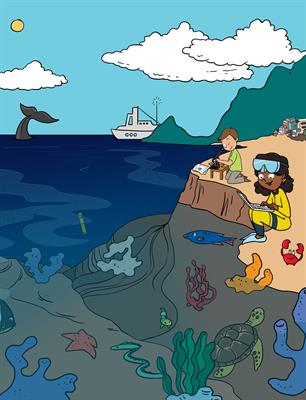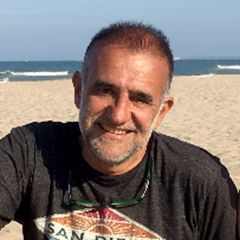
The Ocean, Volume 1
Collection Editors
Hervé Claustre, Carolyn Scheurle, Laura Lorenzoni, Sanae Chiba, Emily KingViews
297,749 viewsParticipating Sections
Submission Deadline
Closed
Articles

Biodiversity
07/12/2020
Sharing Electrons: An Extraordinary Friendship...
Authors
Julia M. Otte
Biodiversity
23/11/2020
Marine Protected Areas: A Way to Protect Our...
Authors
Emily S. Nocito, Cassandra Brooks
Earth Sciences
19/10/2020
Why Krill Swarms Are Important to the Global...
Authors
Anna Belcher, Emma L. Cavan, Geraint A. Tarling
Earth Sciences
09/10/2020
Are Warm Ocean Currents Melting the Ice in...
Authors
Mirjam S. Glessmer, Nadine Steiger, Elin Darelius, Anna...
Biodiversity
17/09/2020
Following the Journey of Sea Turtles on Their...
Authors
Aoife Taylor, Emilie Gerard, Hannah Haarmann, Mathilde Giry...
Biodiversity
28/05/2020
The Dark Ocean Is Full of Lights
Authors
Séverine Martini, Warren R. Francis
Biodiversity
24/04/2020
Learning About Whales by Listening for Their Calls
Authors
Rianna Burnham
Biodiversity
12/02/2020
How Do We Choose Technologies to Study Marine...
Authors
Emmanuel Boss, Sasha J. KramerAbout this collection
The ocean was the origin of life on earth billions of years ago and it is vital for the future of humanity. It is vast, deep, harsh and somehow “rebellious” to uncover its secrets and hence, there is much that is unexplored and misunderstood. Scientists need to study the ocean to better understand its functioning and properties, as well as how they shape our environment and impact us. For example, do you know what the role of the ocean is on weather and climate? There still remains so much to explore in ocean biodiversity and the diverse resources that can be found (for example, fish stocks, bio-molecules, and also minerals, oil, and gas). How can we make sure that our use of these resources is done sustainably and how can we minimize our impacts (e.g. pollution, acidification) on the ocean as our human population increases?In this collection of Frontiers for Young Minds, scientists from various disciplines in oceanography share their knowledge and motivations, give insights in innovative tools and recent discoveries to better understand this ocean. The collection will target a large range of oceanic environments from the open ocean to the coast, the surface to the abysses also including specific areas like coral reefs or sea-ice environments. It will cover marine disciplines that range from physics to chemistry, from biology to ecology and from economy to conservation and policies. It will address innovative tools and methods that are used to observe and characterize oceanic properties and features: ships and satellites, the highly diverse variety of robots as well as genomics or artificial intelligence. Finally, it will encompass a great variety of scales, ranging from the diel to geological time-scales and from loco-regional to global scales and also from the tiniest cells to the biggest living animals on our planet.
The United Nations have declared the 2021-2030 period as the “Decade of Ocean Science for Sustainable Development”, stressing the urgent need to approach fundamental issues related to the ocean and the future of humanity on well sounded scientific grounds and knowledge. This Ocean collection aims to provide information to young readers that will help them to increase their understanding of the ocean and its central role in nature and our lives. We hope to empower them to make informed decisions in these challenging times and to engage to protect, study and enjoy its richness.
Would you like to submit to this collection?
For researchers interested in submitting to this Collection, please consult our author guidelines and check that you have all the essentials included before submitting













